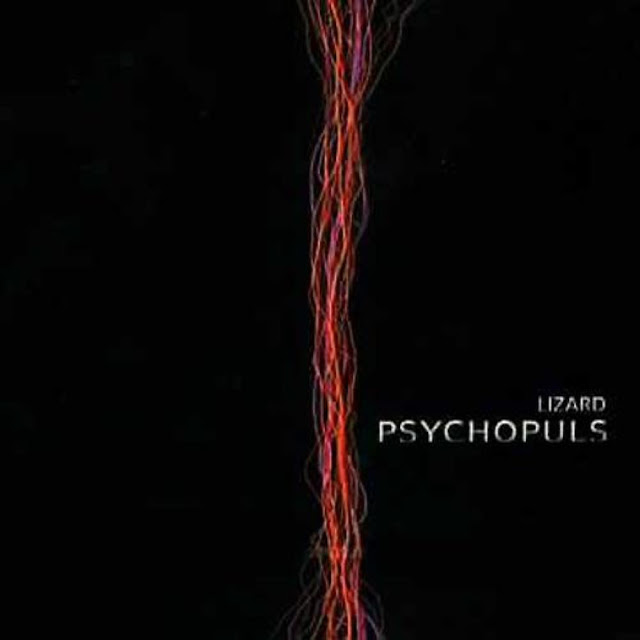Lizard – Psychopuls (Metal Mind Productions, 2004)
Ci sono dischi che sembrano saper aspettare. Restano lì, al
margine, come se sapessero che prima o poi ci inciamperai.
Psychopuls dei polacchi Lizard è uno di quei dischi. È uscito nel
2004, l’anno in cui è nata mia figlia. Un anno così pieno, così denso, che
probabilmente non avrei potuto accoglierlo allora, nemmeno se me lo avessero
messo davanti. Ma la musica, a volte, ha una sua pazienza silenziosa. E ti
raggiunge quando sei pronto.
È un album che non fa sconti. Il suono è tagliente, stratificato, a tratti feroce, ma mai gratuito. Si sente il debito verso King Crimson – soprattutto quello dell’era Wetton-Bruford – ma è solo una base di partenza. I Lizard costruiscono qualcosa di loro: un progressive nervoso e moderno, che si nutre di elettronica, psichedelia, frammenti metal, incursioni funk e improvvise aperture melodiche.
A tenere le redini del suono c’è la voce e la chitarra – spesso filtrata attraverso il guitar synth – di Damian Bydliński, presenza carismatica e punto di equilibrio tra tensione e melodia. Alle tastiere Andrzej Jancza disegna paesaggi sonori che sanno essere tanto inquieti quanto lirici, mentre Janusz Tanistra al basso tesse linee solide, mai banali, capaci di reggere e allo stesso tempo spingere l’intero impianto ritmico. La batteria – acustica ed elettronica – è affidata a Mariusz Szulakowski, vero motore creativo della band, preciso e immaginifico. E poi c’è Krzysztof Maciejowski, al violino e alle tastiere, che pur non essendo membro fisso, contribuisce in modo essenziale al carattere del disco: la sua presenza si sente, eccome, e aggiunge sfumature imprevedibili al tessuto sonoro.
I brani si sviluppano come capitoli di un racconto sonoro unitario, collegati da un filo sotterraneo che li rende parte di un disegno più grande. La suddivisione in parti – Psychopuls #001, #002, #003 e così via – non è solo un vezzo concettuale: ogni sezione esplora un umore diverso, una variazione sul tema, come in una suite costruita per movimenti, ma senza il bisogno di dichiararlo apertamente.
Si parte con l’introduzione elettronica e disorientante di Part 1, subito seguita dalla tensione crescente di Part 2, dove la band mostra fin da subito la capacità di costruire paesaggi sonori ipnotici e stratificati. Psychopuls #002 Part 2 si muove su territori più ruvidi, ma sempre misurati, tra groove funk, inserti techno e improvvise aperture malinconiche. La trilogia di #003 passa da un inizio rarefatto a una ballata acustica, fino a un intreccio strumentale di grande finezza. E poi #002,0 A7, uno dei momenti più spiazzanti del disco, dove si mescolano atmosfere da avanguardia e rilassatezza da chill-out, in una forma che sfugge a ogni etichetta. A chiudere, Psychopuls #004: oltre undici minuti di tensione e rilascio, in cui si avverte l’eco dei Crimson più cupi ma anche la volontà di portarli altrove, dentro un suono filtrato attraverso il presente.
C’è una malinconia controllata, un’energia compressa che a
tratti esplode e a tratti si trattiene. E poi c’è quella strana sensazione di
ascoltare qualcosa di familiare e, allo stesso tempo, nuovo.
Psychopuls non cerca di essere accessibile, ma ha il raro dono di farsi
capire lo stesso. E mentre lo ascolti, ti accorgi che i Lizard non
stanno inseguendo modelli, ma stanno costruendo un linguaggio loro – e ci
riescono, con coerenza e personalità.
Vent’anni dopo, questo disco ha ancora qualcosa da dire. A me lo ha detto adesso, con tutta la forza di un incontro inatteso. E magari, da qualche parte, c’è qualcun altro pronto ad ascoltarlo per la prima volta. Magari nel momento giusto.
English version
Lizard – Psychopuls (Metal Mind Productions, 2004)
There are albums that seem to know how to wait. They stay there, on the edge, as if they knew you’d stumble upon them sooner or later.
Psychopuls by the Polish band Lizard is one of those albums. It came out in 2004, the same year my daughter was born. A year so full, so intense, that I probably wouldn’t have been able to fully welcome it back then, even if it had been put right in front of me. But music sometimes has a quiet patience of its own. And it reaches you when you’re ready.
This is an album that doesn’t make concessions. The sound is sharp, layered, sometimes fierce, but never gratuitous. You can feel the debt to King Crimson – especially the Wetton-Bruford era – but that’s just the starting point. Lizard build something of their own: a nervous and modern progressive rock that feeds on electronics, psychedelia, metal fragments, funk bursts, and sudden melodic openings.
Holding the reins of the sound is Damian Bydliński’s voice and guitar – often filtered through guitar synth – a charismatic presence balancing tension and melody. On keyboards, Andrzej Jancza paints soundscapes that are as unsettling as they are lyrical, while Janusz Tanistra on bass weaves solid, never banal lines that both support and propel the whole rhythmic framework. Drums – acoustic and electronic – are entrusted to Mariusz Szulakowski, the band’s true creative engine, precise and imaginative. And then there’s Krzysztof Maciejowski on violin and keyboards, who, though not a permanent member, contributes essentially to the album’s character: his presence is felt strongly, adding unpredictable shades to the sonic fabric.
The tracks unfold like chapters of a unified sonic story, connected by an underlying thread that makes them part of a larger design. The division into parts – Psychopuls #001, #002, #003* and so on – isn’t just a conceptual whim: each section explores a different mood, a variation on a theme, like a suite built in movements, but without needing to announce it openly.
It starts with the electronic and disorienting introduction of Part 1, immediately followed by the growing tension of Part 2, where the band shows right away its ability to build hypnotic and layered soundscapes. Psychopuls #002 Part 2 moves into rougher but always measured territories, between funk grooves, techno inserts, and sudden melancholic openings. The trilogy of #003 moves from a sparse beginning to an acoustic ballad, and then to a finely woven instrumental interplay. Then comes #002,0 A7, one of the album’s most disorienting moments, blending avant-garde atmospheres with chill-out relaxation, in a form that defies any label. To close, Psychopuls #004: over eleven minutes of tension and release, where echoes of the darkest Crimson can be heard, but also a desire to take them elsewhere, filtered through a contemporary sound.
There’s a controlled melancholy, a compressed energy that at times explodes and at others holds back. And then there’s that strange feeling of hearing something familiar and, at the same time, new.
Psychopuls doesn’t aim to be accessible, but it has the rare gift of being understood anyway. And as you listen, you realize that Lizard aren’t chasing models, but building their own language – and they succeed, with coherence and personality.
Twenty years later, this album still has something to say. It spoke to me just now, with all the force of an unexpected encounter. And maybe, somewhere out there, someone else is ready to hear it for the first time. Maybe at just the right moment.

